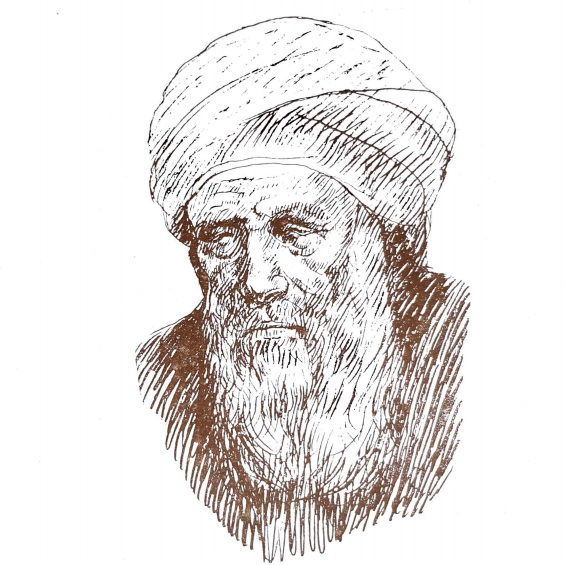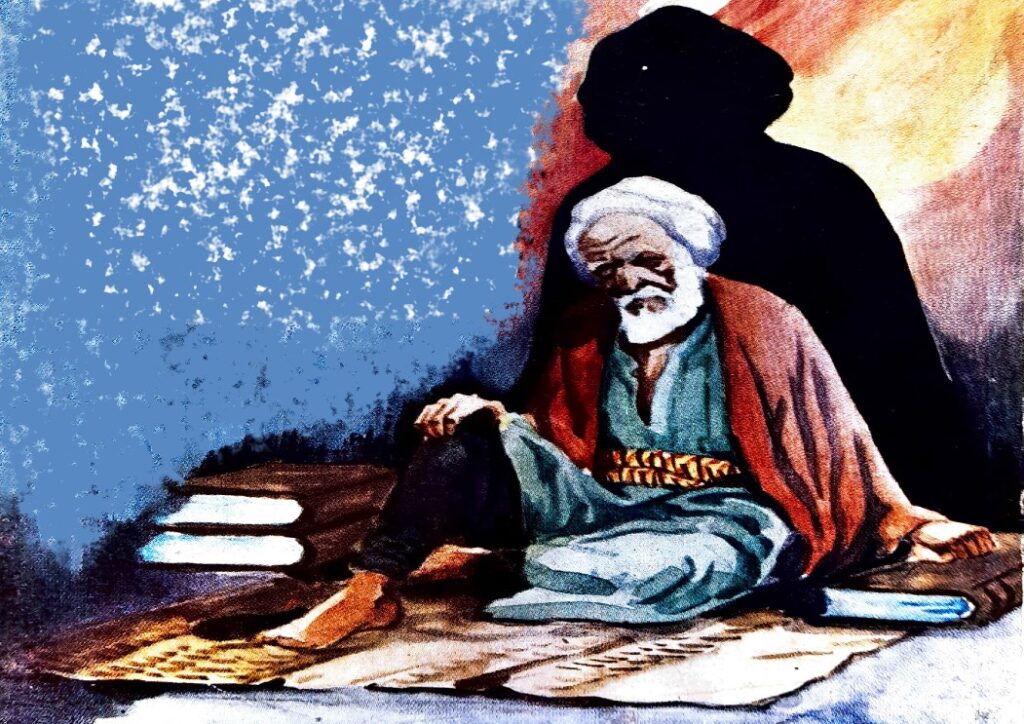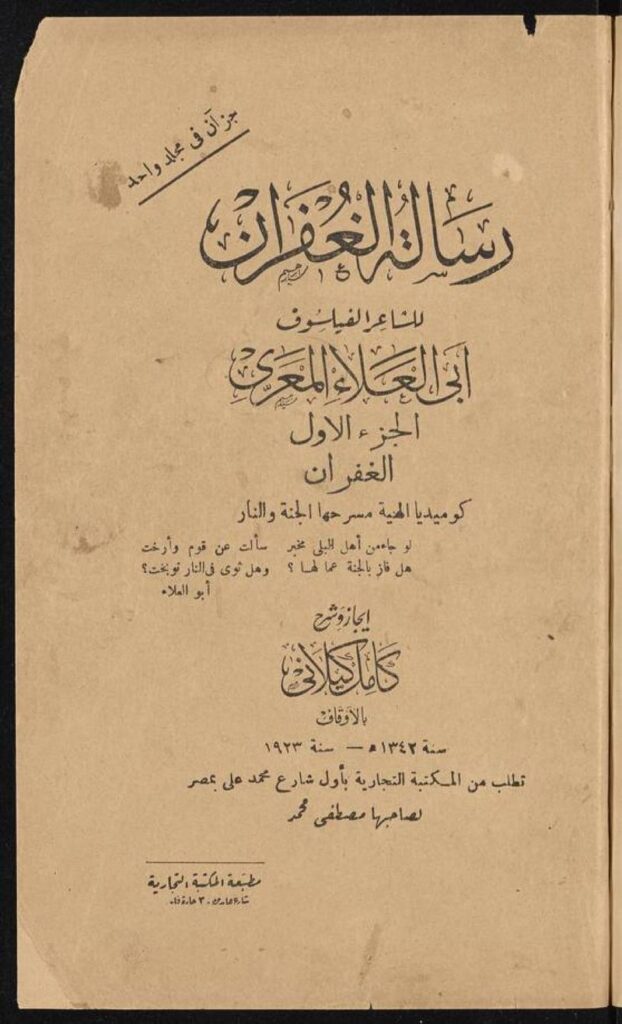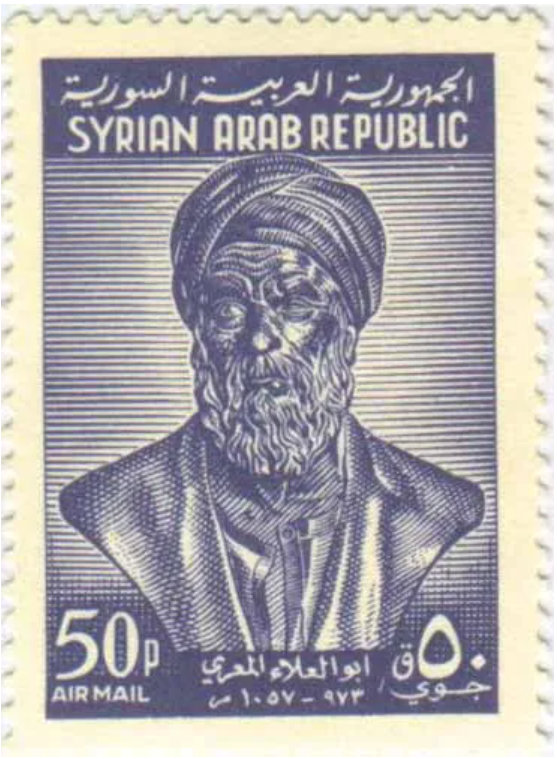Al-Ma’arri: Medieval Anti-Theist, Vegan, and Anti-Natalist?

By Liam Nagle / Arab America Contributing Writer
Al-Ma’arri, a relatively obscure Arab philosopher from the Golden Age of Islam, is perhaps best described as a pessimist. He held several beliefs that were controversial not only in his time but even today. First, while he believed in a God, he was critical of organized religions. Second, he is recognized as the earliest recorded vegan in history, abstaining from both meat and all animal products. Third, Al-Ma’arri advocated for humans to refrain from having children. These convictions made him not just a thinker ahead of his time but possibly ahead of ours as well. Who was this man, and what drove these radical beliefs?
The Life of al-Ma’arri

Al-Ma’arri was born in December 973 to an influential family and tribe in the town of Al-Ma’arra, now part of present-day Aleppo. At the time, the region was under the control of the Abbasid Caliphate. At the age of four, a smallpox infection left him blind for life. Despite this challenge, Al-Ma’arri pursued education, studying in cities like Aleppo and Antioch during his teenage years.
After completing his studies, Al-Ma’arri moved to Baghdad, where he began writing his early poetry. He was well-received by the city’s literary community. However, his refusal to sell his works made finding a patron to support him difficult. When he learned of his mother’s ill health, he left Baghdad and returned to Al-Ma’arra around 1010. Although his mother passed away before his return, he chose to remain in the town, living a secluded life and rarely leaving his house. During this time, he adopted a vegetarian—and later vegan—diet. Nevertheless, he continued writing poetry but still refused to sell his work. Students and scholars regularly visited him, and he often corresponded with others abroad. Al-Ma’arri lived most of his life in relative seclusion and died in 1057 at the age of 83.
Anti-Theism

Al-Ma’arri is sometimes labeled as one of the earliest atheists of his time. However, this assessment may be misleading. Al-Ma’arri did not reject religion outright; rather, he was skeptical of organized religion, which he viewed as useful only to those who exploited the masses. One of his most famous quotes on religion is the following:
Do not suppose the statements of the prophets to be true; they are all fabrications. Men lived comfortably till they came and spoiled life. The sacred books are only such a set of idle tales as any age could have and indeed did actually produce.
His criticism of religion extended to Christianity, Judaism, and Islam. Al-Ma’arri argued that belief in organized religion was inherently flawed, asserting that the religion one follows is largely determined by the circumstances of one’s birth. For instance, someone born in Europe is more likely to adhere to Christianity, while someone born in the Middle East or North Africa is more likely to follow Islam. According to Al-Ma’arri, neither religion is inherently more true than the other; it is simply a matter of individual perception.
Veganism

Al-Ma’arri is the earliest known practitioner of veganism—the belief in abstaining from all animal products, including meat and dairy. Although he was briefly a non-practitioner and then a vegetarian, he adopted veganism during his years of seclusion in Al-Ma’arra. One of his primary reasons for this was his belief that humanity should minimize its impact on the world. He wrote:
Do not unjustly eat fish the water has given up, and do not
desire as food the flesh of slaughtered animals,
Or the white milk of mothers who intended its pure draught for
their young, not for noble ladies.
And do not grieve the unsuspecting birds by taking their eggs;
for injustice is the worst of crimes.
And spare the honey which the bees get industriously
from the flowers of fragrant plants;
For they did not store it that it might belong to others, nor did
they gather it for bounty and gifts.
I washed my hands of all this; and wish that I had perceived
my way before my hair went gray!
However, this may not have been the only reason. Al-Ma’arri once mentioned that his abstention from animal products might have been influenced by his economic hardships, which limited him to eating “beans and lentils, and such food as I would rather not mention.”
Anti-Natalism

Al-Ma’arri was also an anti-natalist, holding the belief that humans should refrain from reproducing. This view stemmed from his inherent pessimism about life. He argued that abstaining from having children would spare them “the pains of life.” Additionally, his anti-natalist stance may have been influenced by humanity’s negative impact on the world. He once wrote that people should “soften [their] tread. Methinks the earth’s surface is but bodies of the dead, walk slowly in the air, so you do not trample on the remains of God’s servants.” Al-Ma’arri adhered to anti-natalism until his death in 1057, having never married or had children. His epitaph, located outside his former home in Al-Ma’arra (now Aleppo), reads: “This is my father’s crime against me, which I myself committed against none.” Despite his belief in leaving as little of a trace as possible, his grave in Aleppo still stands to this day.
Check out our blog here!









